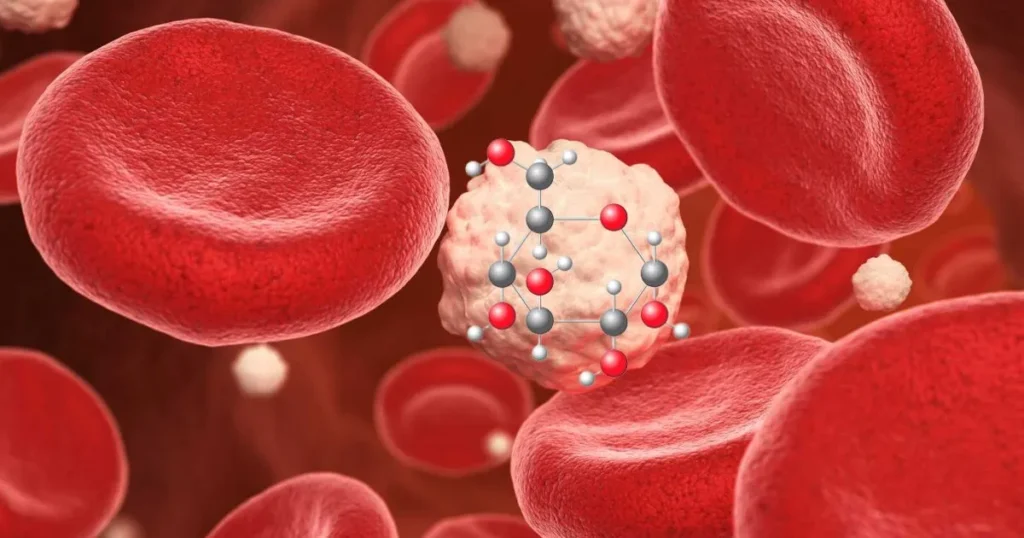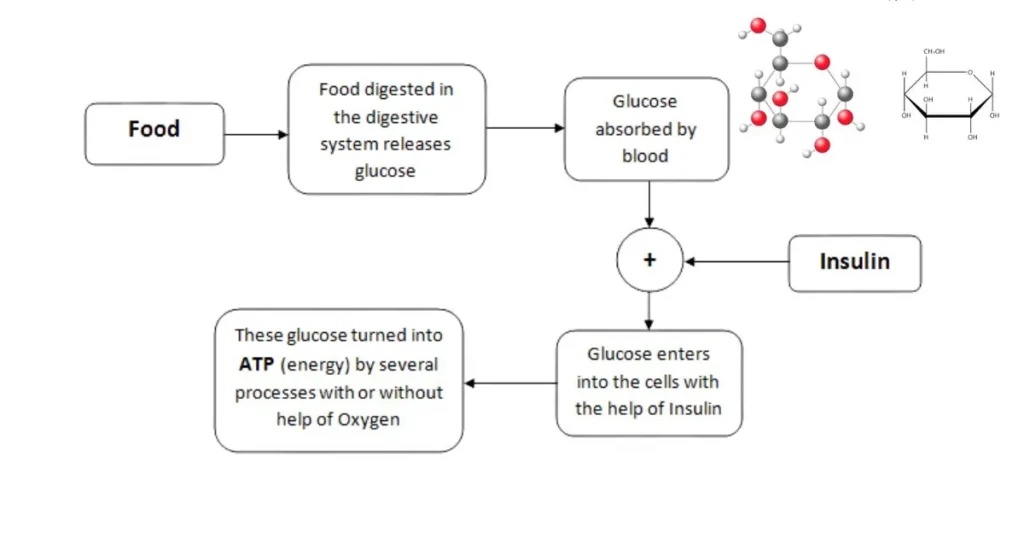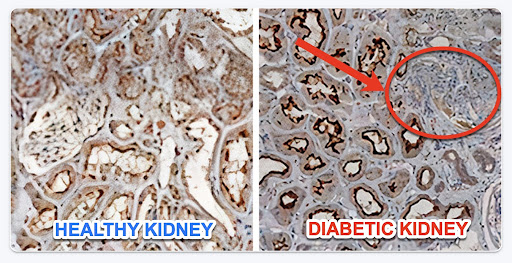Introduction
Definition of Blood Sugar

Blood sugar is also called glucose. It is an essential energy source for the body’s cells. This sugar is derived from the food we eat. The primary source of blood sugar are carbohydrates, found in foods like pasta, bread, and fruits. Once consumed, these carbohydrates are broken down into glucose, which is then absorbed into the bloodstream with the help of insulin, a hormone produced by the pancreas.
Importance of Blood Sugar in the Body
Blood sugar plays a vital role in the body’s overall functioning. It’s the primary source of energy for the cells that make up our muscles and tissues. It’s also the brain’s main source of fuel, which is essential for maintaining focus, memory, and cognitive function.
However, maintaining balanced blood sugar levels is crucial. If blood sugar levels become too high (hyperglycemia) or too low (hypoglycemia), it can lead to serious health problems. Long-term hyperglycemia can result in diabetes, a chronic condition that can affect various parts of the body. On the other hand, hypoglycemia can cause symptoms like shakiness, sweating, and confusion. In severe cases, it can lead to loss of consciousness.
The Role of Blood Sugar in the Body
Energy Supply for Cells
Blood sugar, or glucose, is the primary source of energy for the body’s cells. When we consume foods, especially those rich in carbohydrates, our bodies break them down into glucose. This glucose is then transported through the bloodstream to the cells throughout our bodies. With the help of insulin, cells absorb glucose and convert it into energy to fuel bodily functions and physical activity. Maintaining a steady supply of glucose is crucial for the optimal functioning of our cells and, by extension, our overall health.

Brain Function
The brain is the organ that consumes the most energy in the body, and glucose is its primary fuel source. Unlike other cells, the brain can’t store glucose, so it requires a constant supply from the bloodstream. This is why maintaining balanced blood sugar levels is crucial for cognitive function. When blood sugar levels are too low, it can lead to symptoms like confusion, dizziness, and difficulty concentrating. On the other hand, consistently high blood sugar levels can damage blood vessels in the brain over time, potentially leading to cognitive decline.
Hormonal Regulation
Blood sugar levels are closely tied to the function of various hormones, most notably insulin and glucagon. Insulin, produced by the pancreas, helps cells absorb glucose from the bloodstream. When blood sugar levels are high, such as after a meal, the pancreas releases more insulin to help cells take in glucose and lower blood sugar levels. Conversely, when blood sugar levels are low, the pancreas releases glucagon. This hormone signals the liver to release stored glucose into the bloodstream, raising blood sugar levels. This delicate balance of hormones helps keep blood sugar levels within a healthy range.
Blood Sugar Regulation
Role of Insulin and Glucagon
Insulin and glucagon are two hormones that play a crucial role in blood sugar regulation. Both are produced by the pancreas and work in a kind of seesaw effect to maintain balance. When blood sugar levels rise, such as after a meal, the pancreas releases insulin. Insulin allows cells to absorb glucose from the bloodstream, using it for energy or storing it for later use, thereby lowering blood sugar levels. Conversely, when blood sugar levels drop, the pancreas releases glucagon. Glucagon signals the liver to convert stored glycogen into glucose and release it into the bloodstream, raising blood sugar levels.
The Process of Glucose Metabolism
Glucose metabolism is the process by which our bodies use glucose for energy or store it for future use. After we eat, carbohydrates are broken down into glucose, which is absorbed into the bloodstream. Insulin then helps cells absorb this glucose. Some of it is used immediately for energy, while some is converted into glycogen and stored in the liver and muscles for later use. When energy is needed, such as between meals or during physical activity, stored glycogen is converted back into glucose and released into the bloodstream.
The Concept of the “Blood Sugar Drain” in Kidneys
The “Blood Sugar Drain” is a concept that refers to the role of the kidneys in blood sugar regulation. When there’s excess sugar in the bloodstream, the kidneys work to filter it out and excrete it in urine, effectively “draining” it from the body. However, if this drain becomes clogged, it can lead to elevated blood sugar levels. According to research from Johns Hopkins University, maintaining a smoothly operating Blood Sugar Drain is crucial for balanced blood sugar.
- Drinking wine to balance your blood sugar may sound crazy…But Harvard researchers have identified a unique ingredient found only in one type of South American wine as “a promising new therapy” for anyone worried about their blood sugar.In fact, research published in the International Journal of Molecular Sciences proves this one ingredient starts working almost immediately…Dropping blood sugar by more than 15% in less than one hour!The best part?After just three months, EVERY single patient who did THIS daily moved from ‘high risk’ into the healthy normal range.Could it work this well for you too?>>Find out here and start lowering your blood sugar today
High Blood Sugar (Hyperglycemia)
Causes of High Blood Sugar
High blood sugar, also known as hyperglycemia, occurs when the body has too much glucose in the bloodstream. This can be caused by several factors. Consuming a diet high in carbohydrates and sugars can lead to increased blood sugar levels. Lack of physical activity, which helps the body use up glucose for energy, can also contribute to hyperglycemia. Certain medical conditions, most notably diabetes, can cause high blood sugar. In people with diabetes, the body either doesn’t produce enough insulin or can’t use insulin effectively, leading to an accumulation of glucose in the bloodstream.
- This tiny purple berry can help you pee out high blood sugar.It sounds weird.But folks who’ve tried it no longer need Metformin or insulin…Instead…Their blood sugar is now stable – even if they eat “cheat” food like pasta, pizza, and pie.Simply eat this berry and in less than 1-hour it will:
- ✅ Help you pee out sugar✅ Restore healthy A1C levels✅ And boost your energy
- What’s more…So if you’d like to FINALLY regain control over your blood sugar…This “tiny purple berry” could be exactly what you’re looking for.To your health,
Symptoms of High Blood Sugar
Symptoms of high blood sugar can vary from person to person, but common signs include frequent urination, increased thirst, fatigue, blurred vision, and headaches. In severe cases, high blood sugar can lead to diabetic ketoacidosis, a serious condition characterized by symptoms like nausea, vomiting, rapid breathing, and confusion.
Long-Term Effects of Untreated Hyperglycemia
If left untreated, chronic hyperglycemia can lead to serious long-term complications. High blood sugar levels can damage blood vessels, leading to heart disease, stroke, kidney disease, and poor circulation, which can result in wounds that don’t heal and potential amputation. It can also cause nerve damage, leading to numbness and pain in the hands and feet, a condition known as peripheral neuropathy. High blood sugar can also affect the eyes, leading to conditions like diabetic retinopathy and cataracts. Regular monitoring of blood sugar levels and appropriate management, including lifestyle changes can help prevent these complications.
Low Blood Sugar (Hypoglycemia)
Causes of Low Blood Sugar
Low blood sugar, also known as hypoglycemia, occurs when the glucose levels in the bloodstream drop below normal. This can be caused by several factors. Skipping meals or not eating enough carbohydrates can lead to low blood sugar. Overdosing on insulin or other diabetes medications can also cause hypoglycemia. Excessive physical activity without adequate food intake can deplete the body’s glucose stores, leading to low blood sugar. Certain medical conditions, such as some types of liver disease, can also cause hypoglycemia.
Symptoms of Low Blood Sugar
Symptoms of low blood sugar can vary from person to person, but common signs include shakiness, sweating, hunger, irritability, dizziness, and confusion. In severe cases, low blood sugar can lead to loss of consciousness or seizures.
Long-Term Effects of Untreated Hypoglycemia
If left untreated, severe hypoglycemia can lead to serious complications. Repeated episodes of low blood sugar can cause hypoglycemia unawareness, a condition where the body stops showing symptoms of low blood sugar, making it harder to recognize and treat. Severe hypoglycemia can also lead to seizures, loss of consciousness, and in extreme cases, coma or death. Regular monitoring of blood sugar levels and appropriate management, including balanced nutrition and proper medication use, can help prevent these complications.
Diabetes: A Chronic Condition Related to Blood Sugar
Type 1 Diabetes
Type 1 diabetes, previously known as juvenile diabetes, is a chronic condition where the pancreas produces little or no insulin, a hormone needed to allow glucose to enter cells to produce energy. The exact cause of type 1 diabetes is unknown, but it’s generally understood to be an autoimmune condition where the body’s immune system mistakenly attacks and destroys insulin-producing cells in the pancreas. People with type 1 diabetes need to take insulin every day to survive.
Type 2 Diabetes
Type 2 diabetes is a chronic condition that affects the way the body processes glucose. In this type of diabetes, the body either resists the effects of insulin or doesn’t produce enough insulin to maintain normal glucose levels. Type 2 diabetes is often linked to obesity and lack of physical activity, and it’s more common in adults, though it can occur at any age. Management includes lifestyle changes, such as diet and exercise, oral medications, and sometimes insulin.
Not sure if you know this, but…
You do NOT need Metformin or endless insulin injections to balance out your blood sugar.
Instead, just.. drink THIS.
Then literally do nothing else.
No needles.

No glucose monitors.
And no side effect filled drugs.
In fact, people who drank this glucose-balancing brew with breakfast…
Stabilized their blood sugar by lunchtime…
Enjoyed more energy all day long…
With zero cravings for carbs or sugar.
Some men and women even reported dropping pounds of stubborn body fat in the first week!
Thousands of Type II diabetics now enjoy PERFECT blood sugar – and you can too.
==> All you need is one cup of THIS in the morning
It might sound odd, but this blood sugar balancing brew was first discovered by a former US Military doctor — who showed it can correct your blood sugar, cut belly fat, and revive energy levels. Watch how.
Gestational Diabetes
Gestational diabetes is a type of diabetes that occurs in some women during pregnancy. During pregnancy, the placenta produces hormones that make a woman’s cells less sensitive to the effects of insulin, which can lead to high blood sugar. Most women with gestational diabetes can manage their blood sugar levels with diet and exercise, but some may need medication. Although it usually resolves after the baby is born, women who’ve had gestational diabetes have a higher risk of developing type 2 diabetes later in life.
Prediabetes
Prediabetes is a condition where blood sugar levels are higher than normal, but not high enough to be diagnosed as diabetes. It’s often a precursor to type 2 diabetes. People with prediabetes are also at increased risk of developing heart disease and stroke. Lifestyle changes, such as improving diet, increasing physical activity, and losing weight, can often help bring blood sugar levels back to normal and prevent the progression to type 2 diabetes.
This is pretty scary, but…
Almost every type 2 diabetic who lost their eyesight or suffered a limb amputation had this “sticky gray mucus” coating their kidneys…
Trapping dangerous sugar in their bloodstream:

The problem is, hardly any doctors ever talk about this…
So most type 2 diabetics have no idea there’s a powerful new method to support their kidneys…
Flush out deadly sugar from their bloodstream…
And balance blood glucose levels almost instantly.
This new method takes less than 60 seconds and you can do it from the comfort of your own home.
>> Go here to see how it works.
Folks don’t realize their kidneys are compromised until it’s way too late, so if you’re diabetic or even pre-diabetic, go here now while you still have time.
Introducing GlucoBerry™
The Concept and Purpose of GlucoBerry™
GlucoBerry™ is a dietary supplement designed to support healthy blood sugar levels. The concept behind GlucoBerry™ is to provide a natural, holistic approach to blood sugar management. It’s designed to complement a balanced diet and regular exercise, forming part of a comprehensive strategy for maintaining healthy blood sugar levels. GlucoBerry™ is not a replacement for prescribed medication, but rather a supplement to support overall health and wellbeing.
The Unique Formula of GlucoBerry™
GlucoBerry™ boasts a unique formula that includes maqui berry extract, chromium, biotin, and Gymnema leaf. Maqui berry extract is rich in antioxidants and may help reduce oxidative stress and inflammation. Chromium is an essential trace mineral that can enhance the role of insulin, the hormone critical to the metabolism and storage of carbohydrate, fat, and protein in the body. Biotin, a B-vitamin, plays a key role in the metabolism of nutrients, while Gymnema leaf has been used in traditional medicine for centuries to help reduce sugar cravings and support healthy blood sugar levels.
How GlucoBerry™ Supports a Healthy “Blood Sugar Drain“
GlucoBerry™ is designed to support the “Blood Sugar Drain” concept, which refers to the kidneys’ role in filtering excess sugar from the bloodstream. By supporting a healthy “Blood Sugar Drain”, GlucoBerry™ can help maintain balanced blood sugar levels. It’s important to note that while GlucoBerry™ can support blood sugar management, it should be used as part of a comprehensive approach that includes a balanced diet, regular exercise, and regular check-ups with a healthcare provider.
Managing Blood Sugar Levels
Importance of Diet and Exercise
Diet and exercise play a crucial role in managing blood sugar levels. A balanced diet rich in whole grains, lean proteins, fruits, and vegetables can help maintain steady blood sugar levels. Regular physical activity helps the body use glucose for energy, reducing the amount in the bloodstream. It’s recommended to consult with a healthcare provider or a dietitian to create a diet and exercise plan that suits individual needs and lifestyle.
Medications and Insulin Therapy
For some people, diet and exercise alone may not be enough to manage blood sugar levels. In such cases, medications or insulin therapy may be necessary. These treatments work in various ways to lower blood sugar levels, such as increasing insulin production, decreasing the amount of glucose the liver produces, or improving insulin sensitivity. The type of medication or insulin therapy will depend on the individual’s specific needs and the type of diabetes they have.
Regular Monitoring and Check-Ups
Regular monitoring of blood sugar levels is essential for people with diabetes or those at risk. This can help identify high or low blood sugar levels before they become serious. Regular check-ups with a healthcare provider are also crucial to monitor the condition and adjust treatment plans as necessary.
The Role of GlucoBerry™ in Blood Sugar Management
GlucoBerry™ can play a supportive role in blood sugar management. Its unique formula is designed to support a healthy “Blood Sugar Drain”, helping to maintain balanced blood sugar levels. However, it’s important to note that GlucoBerry™ should be used as part of a comprehensive blood sugar management plan, including a balanced diet, regular exercise, and regular check-ups with a healthcare provider. It’s not a replacement for prescribed medication or medical advice.
Conclusion
Recap of the Importance of Understanding Blood Sugar and the Potential Benefits of GlucoBerry™
Understanding blood sugar and how it’s regulated in the body is crucial for overall health and wellbeing. Blood sugar, or glucose, is the primary source of energy for our cells and plays a vital role in brain function and hormonal regulation. Maintaining balanced blood sugar levels is important to prevent conditions like hyperglycemia and hypoglycemia, which can lead to serious health complications if left untreated.
Products like GlucoBerry™ can play a supportive role in maintaining healthy blood sugar levels. With its unique formula, including maqui berry extract, chromium, biotin, and Gymnema leaf, GlucoBerry™ is designed to support a healthy “Blood Sugar Drain“, helping to maintain balanced blood sugar levels.
Encouragement for Proactive Health Management
Managing blood sugar levels requires a proactive approach to health. This includes a balanced diet, regular exercise, regular monitoring of blood sugar levels, and regular check-ups with a healthcare provider. For those who need additional support, products like GlucoBerry™ can be a valuable addition to a comprehensive blood sugar management plan.
Remember, it’s always important to consult with a healthcare provider before starting any new supplement or making significant changes to your diet or exercise routine. With the right knowledge and tools, managing blood sugar levels can be a manageable part of a healthy lifestyle.